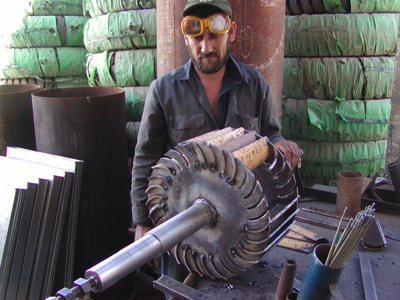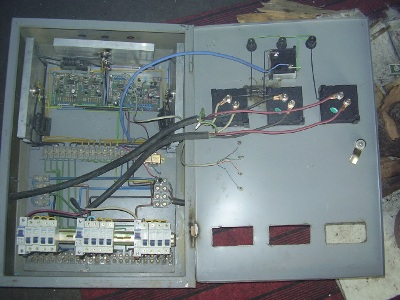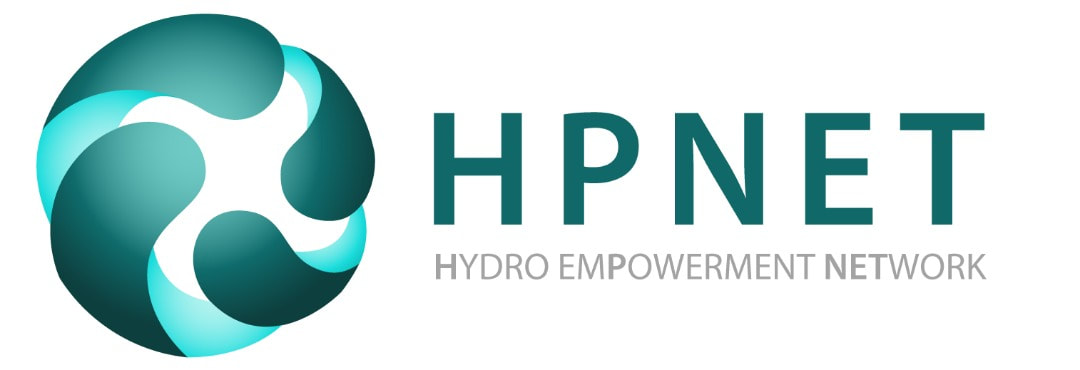- the improvement of the regulatory framework for renewable energies (RE) and energy efficiency (EE);
- vocational training and university education;
- the establishment of service agreements for private owners of RE systems and finally;
- rural electrification of micro and small enterprises (MSE) in the productive use of renewable energy.
|
Decades of civil war have hindered energy infrastructure development in Afghanistan, particularly in rural regions, where 74% of the country’s population resides. Yet, more than 5000 hydro mini-grids were installed in Afghanistan between 2003 and 2015, vastly expanding rural energy access. The majority of these systems are community-owned and -managed, many are self-financed, and nearly all utilize local technology. (For a detailed overview of renewable energy potential and community-based projects in Afghanistan, see this presentation by HPNET member, Sultan Javid.) Over time, micro hydro manufacturing capacity has developed in many regions of Afghanistan, thanks to the ingenuity of local entrepreneurs and the contributions of organizations like HPNET member Remote HydroLight (RHL). Through training and technical support, RHL supported communities seeking to manufacture, install and maintain turbines and electric load controllers (ELCs), from 2006 until 2013. RHL and the International Assistance Mission, which RHL’s founders were involved with prior, supported the installation of about 400 hydro mini-grids in total. Reliable, locally manufactured technology is a foundational element of hydro mini-grid sustainability and community empowerment. For this reason, local technical capacity is prioritized in our SEEED initiative, which supports practitioners and communities to transition toward long-lived hydro mini-grids anchored in local social enterprise. By supporting technical capacity-building, practitioners like RHL can support local actors to achieve sustainable hydro mini-grids and lasting community empowerment. Indeed, although RHL discontinued activities in-country in 2013, many systems that were supported by RHL are still in operation after over a decade, thanks to RHL’s efforts to build the capacity and technical know-how of local workshops. International donors are also stepping up to support the sustainability of small-scale hydropower in Afghanistan. This year, Skat Consulting Ltd. is collaborating with GIZ to assess 400-500 projects for rehabilitation. Assessment will focus on technical aspects, as well as productive end use, which is another critical element of mini-grid sustainability. Read on to hear more about the initiative from Skat consultant and HPNET BoA Member, Dr. Hedi Feibel. Small-scale Hydro and PV Rural Enterprise in Afghanistan The GIZ Energy Sector Improvement Program (ESIP) in Afghanistan, under its four objectives, supports: Under the fourth component, an “RE survey tool” has been developed to assess the current situation in the three provinces of Badakhshan, Takhar and Bamyan with regard to their RE supply and possible improvement, in particular for enterprises and their productive use of energy. The tool is an excel file which is filled with data and information collected by the local team of more than 30 experts of a joint venture between VOLTAF and SH Consultants. Before and during the survey, the local team is supported and guided by the mini hydro experts of Skat Consulting Ltd. and a solar expert of intec-gopa. The international consultants mainly act as external data evaluators, quality assurers and technical solution advisers on data collected from the national team during the survey. During the tough winter months, the team started the survey and provided valuable data, information and photos. The collected information will be condensed in various types of “fact sheets” (e.g. district fact sheets, MHP fact sheets, etc.) to finally assess, evaluate and select energy systems to be rehabilitated (MHP systems) or newly installed (solar PV systems), to increase income generation in MSEs that guarantee cost-covering operation of the RE systems in rural areas. The approximately 400-500 MHP fact sheets will summarise the technical and managerial status of the schemes to quickly assess the potential for improvement. Guest blog post written by HPNET Board of Advisors member Hedi Feibel, PhD, of Skat Consulting Ltd., with introduction inputs from Owen Schumacher of Remote HydroLight.
2 Comments
It is not everyone's business to write such a great post, one person in a million can write such a beautiful post and you are one of those millions. I hope that you will write more beautiful posts in life and also hope that you will keep climbing the ladder of achievement in your life, very few people do this but I have full hope from you.
Reply
Your comment will be posted after it is approved.
Leave a Reply. |
Categories
All
Archives
February 2023
|


